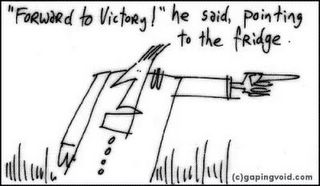Clear Channel in a Stealth Promotional Campaign - New York Times
NY Times carries this interesting article on a fake website started by Clear Channel to promote their new format change for one of their stations in Akron, Ohio. I wonder if that will backfire on them in in the future, the format is labelled as the progressive talk format. http://www.radiofreeohio.org (not .com as mentioned in the article) seems to have been killed in the meantime.
Monday, May 30, 2005
Crazy Frog - Axel F - Video
Crazy Frog - Axel F - Video
This was a theme tune I used on Media Network at Radio Netherlands to introduce propagation specialist Mike Bird. The cell-phone ring tone based on the sound of a revving Swedish mo-ped, "Crazy Frog Axel F," appeared set to top the British singles chart Sunday, outselling the new single by Coldplay by nearly four to one.
This was a theme tune I used on Media Network at Radio Netherlands to introduce propagation specialist Mike Bird. The cell-phone ring tone based on the sound of a revving Swedish mo-ped, "Crazy Frog Axel F," appeared set to top the British singles chart Sunday, outselling the new single by Coldplay by nearly four to one.
editorsweblog.org: Create news first, edit later
editorsweblog.org: Create news first, edit later
Interesting comments in Korea on the growing influence of mobile in reporting. With 5 Megapixel cameraphones around the corner (already on sale in Korea), some users may become freelance contributors to newspapers, especially if they get rewarded (perhaps with extra minutes on their mobile subscription?)
Interesting comments in Korea on the growing influence of mobile in reporting. With 5 Megapixel cameraphones around the corner (already on sale in Korea), some users may become freelance contributors to newspapers, especially if they get rewarded (perhaps with extra minutes on their mobile subscription?)
Sunday, May 29, 2005
Radio Shark

Radio Shark from Griffin

Now this is an interesting device. Some of you may know that I am in search of technology to replace the worst human interface ever invented - the radio dial. Millions of Euros worth of content are hidden behind a number which needs to be sung by jingle companies in the vain hope you will remember the dial position.
So what is Radio Shark? It costs 70 US dollars (plus 30 US dollars shipping to Europe). The radio SHARK adds an AM/FM radio to any Mac or PC, but it can record any AM or FM radio broadcast in real time. It suupose it is a bit like TIVO - you can record a scheduled show, or ‘pause’ live radio so you can return right where you left off moments or even hours before (now that's better than the DAB radios in the UK). Bill Whitacre in Washington (see comments) says they already using them successfully for remote monitoring facilities, i.e. being able to listen to the FM band in another city and tuning the radio remotely.
Favourite station presets can be set with the click of a mouse, and new stations can be scanned and tuned. The Radio Shark connects to and is powered by USB. The fin-shaped device acts as an antenna and can be positioned for best reception and recording. Any recorded broadcast can be transferred to an iPod or any other AIFF-compatible digital music player to replay on the go.
Don't know what the performance is like on AM if it too close to the computer monitor. I will try and pick one up on my travels to the States.
Saturday, May 28, 2005
The End is Nigh....

 Domestic public broadcasting in the Netherlands is playing a very defensive role in its arguments towards the Dutch government about the future of public broadcasting. On Friday, the Board of Governors of Netherlands Public Service broadcasting leaked the figure they expect the loss of 1800 jobs if plans by Medy van der Laan (State Secretary for Broadcasting) go ahead in 2008. In addition, the costs of the re-organisation are estimated by NPB to be up to 500 million Euro, to pay off all the staff who won't find work under the new system. The problem in Hilversum is a total mix-up of what is in the interest of the citizen and what is in the interest of the consumer. Wouldn't it be great if public broadcasting took a lead to explain that they can play an important role in Dutch society by encouraging co-operation between various sectors of society - and not integration? But the domestic "omroepen" have always been a team of completely different players and there is little or no public support for the current public broadcasting structure. Something new has to rise out of the ashes of this totally outdated construction. It is a shame they are not looking at what their colleagues in Belgium and Denmark have achieved...often with much less money.
Domestic public broadcasting in the Netherlands is playing a very defensive role in its arguments towards the Dutch government about the future of public broadcasting. On Friday, the Board of Governors of Netherlands Public Service broadcasting leaked the figure they expect the loss of 1800 jobs if plans by Medy van der Laan (State Secretary for Broadcasting) go ahead in 2008. In addition, the costs of the re-organisation are estimated by NPB to be up to 500 million Euro, to pay off all the staff who won't find work under the new system. The problem in Hilversum is a total mix-up of what is in the interest of the citizen and what is in the interest of the consumer. Wouldn't it be great if public broadcasting took a lead to explain that they can play an important role in Dutch society by encouraging co-operation between various sectors of society - and not integration? But the domestic "omroepen" have always been a team of completely different players and there is little or no public support for the current public broadcasting structure. Something new has to rise out of the ashes of this totally outdated construction. It is a shame they are not looking at what their colleagues in Belgium and Denmark have achieved...often with much less money. 
Our Media

I am experimenting with a new grassroots multimedia hosting service called OurMedia, which is working closely with archive.org. If the file is above 10 MB, it seems to automatically go to the archive.org server. Not sure what the business model is supposed to be...the hosting is free. Takes about 2 hours for the videos to show up in the system. Check out Supernova2005 and a video I made for the 60th anniversary of the Commonwealth Broadcasting Association.

Wednesday, May 25, 2005
Wordpress Website's Search Engine Spam
Waxy.org: Daily Log: Wordpress Website's Search Engine Spam
Wordpress OpenSource Blogging Software looked good, until I saw this article on Way.org. This is clearly a case of divided loyalties and lack of transparency.
Wordpress OpenSource Blogging Software looked good, until I saw this article on Way.org. This is clearly a case of divided loyalties and lack of transparency.
Supernova 2005 Video


Of all the conferences in California - and there are plenty each year - Supernova's Kevin Werbach is able to start up the most interesting conversations and put some real meaning into them. The secret? It is relaxed...the subject is people's preferred futures and the technology guys talk about the bigger picture. I'll be attending June 20-22 2005 and I recommend you do too. I made a short 3 minute video highlighting the experience and the reason for the name. Check my video out here: (Quicktime | Windows Media) of last year's conference...more of a trailer actually, to give you an impression. Really, I am travelling continents to be there. If you're also going from Europe, let me know! (p.s. no commercial connection with the organisers...just a supporter of this type of open conversation)
Tuesday, May 24, 2005
Smart Camera Phones Coming...

Telecoms Korea has a great article on the cameraphone war in Korea. The handset industry's attention is focused there on the result of 5-Megapixel war between Samsung and LG.
LG Electronics plans to corner Samsung by providing its 5-megapixel phone (550 Series) to 3 mobile operators, SK Telecom, KTF and LG Telecom from June. LG says they have a more creative design and improved camera functionality. The 550 Series camera equipped with auto-focus, self-shot and VGA (640X480)-level video capability. Strobe flash and half-click shutter are also available. It is enabled with 4cm macro mode and uses the mini SD format as flash memory.
Meanwhile, Samsung Electronics which released the world first 5-Megapixel phone last year is to launch SPH-V7800 upgraded from the 2004 version, also in June.
Samsung's new 5-Megapixel offering is equipped with 3x optical zoom and 4x digital zoom. MP3 player, dual speaker and a TV-out function is also available. The new gadget supports MMC-micro memory flashcards.....another standard! They also have announced plans for 6 and 7 Megapixel cameras.
No word on what sort of lens these camera have. I am using the Sony Cybershot 7.1 Megapixel camera with excellent results (though at 3 MB per photo you need a 512 MB flashcard inside the camera). I have been disappointed with Sony Ericsson's replacements for the P800 phone....basically not much change except they have made the device thinner. The phone software is still not quite there (nearly but no cigar) and I don't see them developing much more for that series of phones.
The BBC World Service bits in the BBC response.


The reponse to UK Government's recent Green paper on broadcasting is just out. The BBC does not go into specifics about the suggestions by the Blair government that BBC WS should cut several language services in radio to fund Arabic language TV. It welcomes the chance to review them though. Recent events in the "Former Soviet Union" would mean that some of the reductions suggested (up to 16 languages for radio to be scrapped) will obviously be toned down. But it still remains a challenge to start a substantial BBC Arabic TV network on a shoe-string budget with so much existing competition in the Middle East and beyond.
The response continues:
the BBC is the only international news broadcaster with a significant
worldwide presence in all three media – radio, TV and the internet. Its consolidated performance across all three media makes it the world’s leading international broadcaster with the highest international reach – over 190 million people using the BBC’s news services each week.
The BBC remains uniquely placed to provide the most trusted, independent and reliable news service in the world and to enable different people to connect with each other in open debate across boundaries and cultures, thereby bringing substantial credit back to the UK. As audience needs and viewing and listening habits are changing radically in all areas of the world, the BBC will develop an integrated global news strategy, co-ordinating its services across all media to deliver a coherent editorial proposition for relevant audiences, however differently the elements may be funded.
The World Service will ensure it invests its limited grant-in-aid resources where they are most needed, and will recognise the changing patterns of consumption and the increasing importance in important markets of both TV and the internet. The BBC therefore welcomes the opportunity to review the present portfolio of 43 language services with a view to significant change.
The Green Paper also reflects current discussions between the World Service and the Foreign and Commonwealth Office about the potential value of vernacular television services, particularly an Arabic television service, and the degree to which the World Service would need to reprioritise grant-in-aid to fund it. The BBC believes there is an urgent need for an Arabic television service and regrets that the Government decided it would not wholly fund the new service proposed by the BBC in the 2004 spending round. The BBC is currently considering what can be done from within existing resources and looks forward to progressing discussions with the
Foreign and Commonwealth Office about the most appropriate delivery methods for content and the range of language services for the future.
The commercially funded television news channel, BBC World, is of growing
importance in the delivery of the BBC’s global news strategy, and needs to be put on a stable financial footing. The channel has seen significant audience growth in recent years. Full-time 24-hour distribution has increased by 75% over the last five years (from 72.5 million households to 127 million) and in the last year alone distribution grew by 13%. About 270 million households can now receive BBC World for at least part of the day. It is the fastest-growing international news channel in Europe and the leading international news service channel in India. This growth has been at a time when most other international news channels have seen stagnating or falling audiences. The BBC is working hard further to increase distribution, particularly fulltime distribution in the United States.
BBC - Future of the BBC - Government Green Paper


BBC - Future of the BBC - Government Green Paper
The BBC's Royal Charter expires at the end of 2006. The Government has undertaken a detailed review of the BBC and its role. Its consultative Green Paper outlined its thinking and asked for comments by 31 May. Its White Paper will then publish firm proposals on the BBC's future and is expected to follow in late 2005.
You can now read the BBC's response to the Government's Green Paper on this page.
I notice you can download the response in Welsh, but not Gaelic.
Great Sense of Humour

Great cartoons with my sense of humour. Shame it hasn't been active recently

Wanna get traffic to your site? Post a few lines in Blogger with titles like
"Why I gave up Tiger for Windows XP"
"Why Podcasting is Dead"
"Let Rupert Murdoch run the BBC commercially"
and watch the numbers rise. But who needs traffic? We're in this blogging business for influence.
Podcast Listening Claims


Little worried about the general credibility of the Pew guys (see previous post below) - after they came out with some ludicrous figures for people who had listened to podcasts. Obviously hadn't listened themselves.
But how many people are really smoking the podcasting dope? I note that the current general figure for the number of active podcasters is around 5500, and according to one of the first Steve Gilmor Podcasts just out, Adam Curry's podcast is estimated to have 50,000. Gilmor claims 10,000. This number will grow once there are easy tools out there (like Podshow) so that one push of a button will help you "go on air". Then writers, journalists, creatives will really have their own voice, not just the geeks who have invented work arounds.
May be we need a definition like "Average Downloads Per Edition"? And how about the Podcast 2006 awards to encourage distinctive content. There is a lot of rubbish out there which is starting to cloud the horizon of interesting content. I am not advocating censorship. But Apple will have to be choosy if they want to start a Podcast business model in the next version of i-Tunes. Hope they get some radio guys to pick and choose the best, not some IT consultants or musicians.
Believe It: The Media's Credibility Headache Gets Worse - New York Times
Believe It: The Media's Credibility Headache Gets Worse - New York Times
Article in today's NY Times by Patrick Healy (sign-up required). He reports that confidence in the media (press and TV - radio isn't mentioned) has reached an all time low ...
Almost like clockwork, each new month seems to usher in a new controversy over journalistic competence or integrity - the latest being the retracted May 9 article in Newsweek, about a report that American interrogators flushed a Koran down the toilet, that has been linked by the White House to at least 17 deaths during anti-American protests that followed.
These events come at a time when American confidence in the news media is at an all-time low. Most other major institutions in public life - while dealing with their own credibility issues - are more trusted.
In the post-Watergate 1970's, some 25 to 30 percent of Americans reported to the Harris Poll that they had a great deal of confidence in the press, more than they had in Congress, unions or corporate America. In the 2005 poll, the press ranked only ahead of law firms, with 12 percent reporting high confidence in the media.
Another poll, in 2003 by the Pew Research Center for the People and the Press, found that 66 percent of Americans see news reports as slanted, compared with 53 percent in 1985. Even more stunning to some analysts, 32 percent judged news organizations to be immoral, up from 13 percent in 1985.
"Today we have a case where the public is suspicious of the values of the news media as well," said Andrew Kohut, director of the Pew Research Center. "I don't know if it's a crisis, but it's a hell of a growing problem."
For the first time, Pew also asked Americans in 2003 if they believed some news organizations, which were not identified, were becoming too critical of America. Nearly half the respondents, 46 percent, said yes; 48 percent said no.
"More people think media companies are motivated by profit, and put stories on the front page to serve that interest, and that reporters are motivated by their own career advancement more than any concern about the country," Mr. Rosenstiel said.
Perhaps an even more dire forecast came in another Pew report, Trends 2005, which found 45 percent of Americans saying they believed little or nothing of what they read in their daily newspapers, up from 16 percent two decades ago.
Being in the US a few weeks back, I thought the new style of networks like Fox and CNN domestic reminded me of 911 reports, where the news is read and the pictures are just video jingles - like the 3 second sound bites. No time for issues, No time at all from context.
Article in today's NY Times by Patrick Healy (sign-up required). He reports that confidence in the media (press and TV - radio isn't mentioned) has reached an all time low ...
Almost like clockwork, each new month seems to usher in a new controversy over journalistic competence or integrity - the latest being the retracted May 9 article in Newsweek, about a report that American interrogators flushed a Koran down the toilet, that has been linked by the White House to at least 17 deaths during anti-American protests that followed.
These events come at a time when American confidence in the news media is at an all-time low. Most other major institutions in public life - while dealing with their own credibility issues - are more trusted.
In the post-Watergate 1970's, some 25 to 30 percent of Americans reported to the Harris Poll that they had a great deal of confidence in the press, more than they had in Congress, unions or corporate America. In the 2005 poll, the press ranked only ahead of law firms, with 12 percent reporting high confidence in the media.
Another poll, in 2003 by the Pew Research Center for the People and the Press, found that 66 percent of Americans see news reports as slanted, compared with 53 percent in 1985. Even more stunning to some analysts, 32 percent judged news organizations to be immoral, up from 13 percent in 1985.
"Today we have a case where the public is suspicious of the values of the news media as well," said Andrew Kohut, director of the Pew Research Center. "I don't know if it's a crisis, but it's a hell of a growing problem."
For the first time, Pew also asked Americans in 2003 if they believed some news organizations, which were not identified, were becoming too critical of America. Nearly half the respondents, 46 percent, said yes; 48 percent said no.
"More people think media companies are motivated by profit, and put stories on the front page to serve that interest, and that reporters are motivated by their own career advancement more than any concern about the country," Mr. Rosenstiel said.
Perhaps an even more dire forecast came in another Pew report, Trends 2005, which found 45 percent of Americans saying they believed little or nothing of what they read in their daily newspapers, up from 16 percent two decades ago.
Being in the US a few weeks back, I thought the new style of networks like Fox and CNN domestic reminded me of 911 reports, where the news is read and the pictures are just video jingles - like the 3 second sound bites. No time for issues, No time at all from context.
Saturday, May 21, 2005
Friday, May 20, 2005
Earthquake Forecasts

Great new map to check if you're planning to be in California. Stuff the weather...this is far more important. It shows the earthquake forecast for the next 24 hrs...at least the probability that things will start falling off shelves. The quake forecasts are produced by adding together some of the best models of earthquake activity. The current map is here.

Wednesday, May 18, 2005
Back Home
Back home at last after nearly 3 weeks of travelling to Mexico City, Spain and Switzerland. I am delighted to find people in the radio and new media business who understand communities and are looking at the new "social" media like wikis and blogs to get closer and involve their audiences.

Stephen Alstrup, Octoshape
My most interesting discovery was a company called Octoshape, based in Copenhagen. They have a technology which allows a much more efficient delivery of "live" streaming over the Internet. At the moment, someone like the BBC has to produce and pay for thousands of separate streams to serve relatively small audiences to its audio and video streams. In a crisis, no system can cope. This technology means that users downloading a stream also act as transmitters for others.. bit like Bit Torrent but then for live streaming. Steven Alstrup has certainly come up with a technology for the future!
Now to get some sleep and sort out the washing

Stephen Alstrup, Octoshape

My most interesting discovery was a company called Octoshape, based in Copenhagen. They have a technology which allows a much more efficient delivery of "live" streaming over the Internet. At the moment, someone like the BBC has to produce and pay for thousands of separate streams to serve relatively small audiences to its audio and video streams. In a crisis, no system can cope. This technology means that users downloading a stream also act as transmitters for others.. bit like Bit Torrent but then for live streaming. Steven Alstrup has certainly come up with a technology for the future!
Now to get some sleep and sort out the washing
Tuesday, May 17, 2005
Great Conversation
Monday, May 16, 2005
Now in Geneva
Sunday, May 15, 2005
Saturday, May 14, 2005
La Granja
Town Square

Enjoying a nice Paella and a beer (San Miguel) on the terrace of this restaurant in down-town Palma, on the Spanish island of Mallorca. Limited connectivity in the hotel (dial-up) so borrowing some bandwidth in the cafe. Great weather - and preparing for another conference on the future of radio. The links between radio and food are unmistakeable....the future radio makers will be like chefs, cooking up some menus in a set meal (transmissions) but preparing components for a la carte (on demand) and ingredients for do-it-yourself (podcasts). Leif Lonsmann of Danish Radio seems to be pioneering this approach - Denmark has nearly 30 digital radio channels, in a country of only 5 million. Impressive strategy.

Minute Waltz
BNR
Subscribe to:
Comments (Atom)












